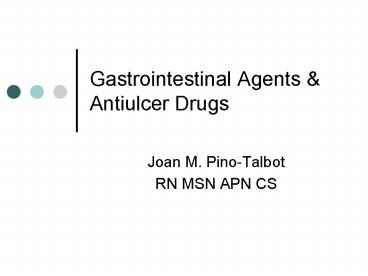Gastrointestinal Agents - PowerPoint PPT Presentation
1 / 32
Title:
Gastrointestinal Agents
Description:
B. Constipation, anxiety, and fever. C. Abdominal cramping, and irritability ... Constipation, anxiety, fever, abdominal cramping, irritability, psychosis, and ... – PowerPoint PPT presentation
Number of Views:853
Avg rating:3.0/5.0
Title: Gastrointestinal Agents
1
Gastrointestinal Agents Antiulcer Drugs
- Joan M. Pino-Talbot
- RN MSN APN CS
2
Drugs for the Gastrointestinal Tract
- Gastrointestinal disorders
- Vomiting
- Toxic substance ingestion
- Diarrhea
- Constipation
3
Cerebral Centers Affecting Vomiting
4
Vomiting (contd)
- Nonpharmacologic measure
- Nonprescription antiemetics
- Antihistamines
- Bismuth subsalicylate
- Phosphorylated carbohydrate solution
5
Prescription Antiemetics
- Prescriptive antihistamines
- Anticholinergic
- Dopamine antagonists
- Phenothiazines
- Butyrophenones
- Metoclopramide
6
Prescription Antiemetics (contd)
- Benzodiazepines
- Serotonin receptor antagonist
- Glucocorticoids
- Cannabinoids
- Miscellaneous
- Diphenidol, droperidol, trimethobenzamide
7
Emetics
- Ipecac is an OTC drug
- Administration
- Take with a glass of water or fluid, not with
milk or carbonated beverage - Vomiting occurs in 20 to 30 minutes and if not,
repeat dose - Gastric lavage may be needed if vomiting does not
occur - Caution avoid vomiting if substance is caustic
or petroleum
8
Diarrhea
- Causes of diarrhea
- Nonpharmacologic measures
- Travelers diarrhea
- Frequent cause Escherichia coli
- Preventive measures
9
Antidiarrheals
- Purpose of antidiarrheals
- Types of antidiarrheals
- Opiates and opiate-related agents
- Diphenoxylate with atropine
- Somatostatin analog, octreotide (Sandostatin) for
severe diarrhea - Adsorbents Kaopectate
- Antidiarrheal combinations
10
Constipation
- Causes
- Nonpharmacologic measures
- Laxatives
- Laxatives vs. cathartics vs. purgatives
- Types of laxatives
- Osmotic (saline)
- Stimulant (contact)
- Bulk-forming
- Emollient (stool softeners)
11
Osmotic (Saline) Laxatives
- Types and action
- Side effect electrolyte imbalances, hypotension,
weakness, etc. - Stimulants ( contact) laxatives
- Types and action
- Side effects abdominal cramps, electrolyte
imbalances
12
Bulk-Forming Laxatives
- Type and action
- Administration of bulk-forming laxatives
- Adverse effects intestinal obstruction without
sufficient amount of water - Stool softeners
- Types and action
13
Bulk-Forming Laxatives (contd)
- Contraindications
- Inflammatory disorders of the GI tract
- Appendicitis
- Diverticulitis
- Ulcerative colitis
- Spastic colon
- Bowel obstruction
- Pregnancy
14
Case Study
- A client who is taking chemotherapy for cancer of
the right kidney is extremely nauseated and
vomiting. - Critical Thinking
- Which type of antiemetic are appropriate for
cancer chemotherapy?
15
Practice Question
- Ondansetron (Zofran) has been ordered for the
client who is taking cancer chemotherapy to
control the severe nausea and vomiting. What side
effects are possible? - A. Headache, dizziness, and fatigue
- B. Constipation, anxiety, and fever
- C. Abdominal cramping, and irritability
- D. Psychosis and middle ear disturbances
16
Practice Question (contd)
- Answer A
- Rationale Side effects of Zofran include
headache, dizziness, and fatigue. Constipation,
anxiety, fever, abdominal cramping, irritability,
psychosis, and middle ear disturbances are not
side effects/adverse effects of Zofran
17
Antiulcer DrugsPeptic Ulcers
- Peptic Unclers
18
Peptic Ulcers
- Gastric secretions
- Gastric mucosal barrier (GMB)
- Peptic ulcers
- Esophageal ulcer
- Duodenal ulcer
- Stress ulcer
- Predisposing factors in peptic ulcers disease
see Table 46-1 - Helicobacter pylori (H. pylori)
- Gastroesophageal reflux disease (GERD)
19
Nonpharmacologic Measures
- Avoid tobacco
- Avoid alcohol
- Weight loss
- Avoid hot, spicy, and greasy foods
- Take any NSAIDs including aspirin and oral
glucocorticoids with food or in deceased dosage - Sit upright
- Do not eat before bed
- Ware loose-fitting clothing
20
Pharmacologic Measures
- Antiulcer drugs
- Tranquilizers
- Anticholinergic drugs
- Antacids
- Histamine2 (H2)-blockers
- Proton Pump Inhibitors
- Pepsin inhibitors
- Prostaglandin E1 analog
21
(No Transcript)
22
Antacids
- Functions
- Types of antacids
- Systemic antacids
- Sodium bicarbonate
- Calcium carbonate
- Side effects
- Hypernatremia
- Water retention
- Hypercalcemia
23
Antacids (contd)
- Nonsystemic antacids
- Aluminum hydroxide (Amphojel)
- Dihyroxyalumium sodium (Rolaids)
- Calcium carbonate (Tums)
- Magaldrate (Riopan)
- Magnesium hydroxide and aluminum hydroxide
(Maalox, Mylanta, Gelusil) - Side effects
- Diarrhea
- Constipation
24
H2-Blockers
- Actions
- Types of H2-blockers
- Cimetidine (Tagamet)
- Lab effects increases BUN, creatinine, and
alkaline phosphatase (ALP) - Drug interactions
- Ranitidine (Zantac)
- Avoid taking with antacids
25
H2-blockers (contd)
- Types of H2-blockers
- Famotidine (Pepcid)
- More potent the cimetidine and ranitidine
- Nixadtidine (Axid)
- OTC H2-blockers
26
Proton Pump Inhibitors (PPIs)
- Functions
- Types of PPIs
- Omeprazole (Prilosec)
- Drug interactions
- Lansoprazole (Aciphex)
- Raberprazole (Protonix)
- Esomeprazole (Nexium)
27
Proton Pump Inhibitors (PPIs) (contd)
- Treatment for
- Peptic ulcers
- GERD
- H.pylori
- Caution hepatic impairment
28
Prostaglandin Analog
- Misoprostol (Cytotec)
- Action
- Uses
- Contraindications
29
Case Study
- A client has peptic ulcer disease due to
H.pylori. An antibiotic and proton pump inhibitor
have been ordered. - Critical thinking
- Explain the importance and use of a dual, triple,
or quadruple drug therapy program in the
eradication of this bacterial infection.
30
Practice Question
- Which of the following are most likely to be
included in a dual drug therapy program for
peptic ulcer disease due to H.pylori? - A. Omeprazole and clarithromycin
- B. Tetracycline and metronidazole
- C. Ranitidine and amoxicillin
- D. Ciprofloxacin and sucralfate
31
Answer to Practice Question
- Answer A
- Rationale Omeprazole and clarithromycin are
commonly included in a dual drug therapy program
for peptic ulcer disease due to H.pylori.
32
Pepsin Inhibitor
- Sucralfate (Carafate)
- Action
- Administration schedule
- Storage































